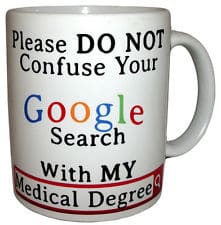Please Don't Confuse Your Google Search
Don't Confuse Your Google Search With My Medical Degree
February 5, 2016
 I read this statement on a mug recently and wondered if I was confused or believed what I read.
I read this statement on a mug recently and wondered if I was confused or believed what I read.
How many Google searches have I done about any particular disease, drug, symptom? So many.
Then, I thought about hospital waiting rooms. While patients and families wait for the clinician to see them, how many people fear what they have read, won't ask questions to clarify whether what they read has anything to do with them, and suffer in embarrassed anxiety?
I googled the following question: "How many patients Google their symptoms?"
I got 38,400,000 hits.
Get Used To It
In 2011, Dr. Zachary F. Meisel wrote on Time.com that physicians should get used to patients coming in with lots of information and misinformation, with printed out webpages with symptoms, pictures, and summary information. At the time, he wrote that physicians should best guide their patients to credible sites to at least get reliable information. Today, this is even more relevant.
Instead of debating whether patients should or should not Google their symptoms, Dr. Meisel thinks we should be asking how we can "translate this phenomenon into better health for their patients and the public?"
Asking patients what they have read about their condition and what their concerns and fears are about what they read seems like a good idea. We already know that what patients do not say about what they know or what they do is a risk factor.
And how about encouraging patients to use their time in the waiting area to productively read about their condition online — pointing them, as Dr. Meisel suggests, to places where they can get good information? Doing this also means creating a waiting area that supports learning.
Good students are those who can engage with information at the time they most want it. The strong and immediate desire to know more about what is happening with them or those they love is a strong motivator.
A Teachable Moment
How can we take advantage of this teachable moment to push into healthier living?
The whole environment must support learning, honest communication, and be responsive to the needs of those within them. Here are some ideas:
- Seating: Make sure the seating arrangement allows patients some privacy, so that what they are reading is not being read by the person next to them.
- Computers/charging stations: Provide computers already set up to go to a credible, easy to access database of information.Have at least 2-3 workstations with websites already bookmarked or icons on the desktop. Charging stations free patients from worrying about staying connected when they are using their own mobile devices or laptop computers. And the freer they are, the most they can focus.
- Desks/tables with notepads:Have pads and pens available near the computers so patients can make notes and a printer so that they can also print out what they find.
- Encouragement: Staff should greet patients and sign them in, encouraging them to use the computers and/or notepads to prepare for their visit.
Also, don't worry about the cost to do all this. It's very little compared to cost of health illiteracy and lack of patient engagement and involvement in their own health.
P.S. If you like this post, please do me a favor and share on LinkedIn, Twitter, Facebook, etc. Also to get automatic notices when a new post is published, subscribe (upper right). No spam – just great content. Thanks!
Please Don't Confuse Your Google Search
Source: https://www.healinghealth.com/wp/google-search-medical-degree/
Posted by: smithglight.blogspot.com

0 Response to "Please Don't Confuse Your Google Search"
Post a Comment